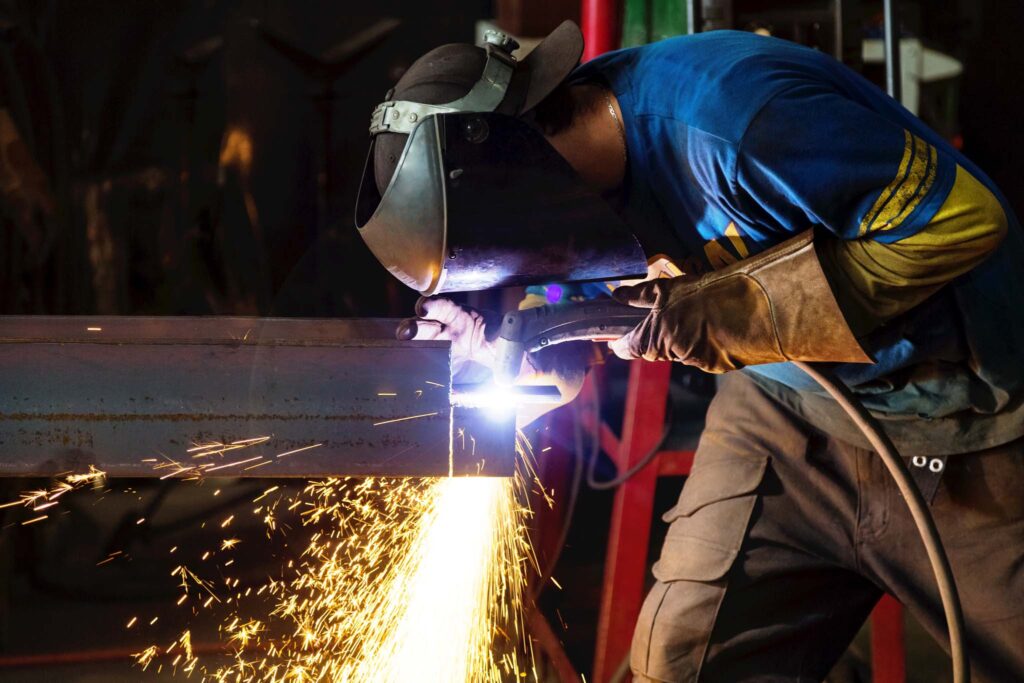Skilled Trades in High Demand
Looking for a stable career with lots of opportunity? These are some of the many skilled trades that are in demand in Ontario right now.

10 Skilled Trades in High Demand
01
Child Development Practitioner
Here is a job that, regardless of the setting, the focus remains the same: children’s health. As a Child Development Practitioner, you will plan and implement age-appropriate services, support, and programs for children. Your work will facilitate their physical, social, emotional, and cognitive growth. CDPs deliver services in childcare centres, the preschool sections of hospitals and schools, and Ontario Early Years Centres.
On the job, you will foster relationships with children, plan developmentally appropriate programs, apply intervention strategies, support emergent learning practices, and cultivate family, cultural, and social relationships. You will participate in a team environment with families, colleagues, community members, and support services providers.
02
General Carpenter
The General Carpenter of today does a lot more than woodworking. They also construct, renovate, and repair structures made of steel, concrete, and other materials. You will build door and window systems, stairs, posts, and handrails. You will also install concrete foundations and frame floors, walls, ceilings, and roofs.
From the get-go, you establish building plans and prepare worksites. Your work will come in the form of houses, condos, stores, and skyscrapers. You are making an impact from the ground, up.
03
Electrician
Looking for a job with a jolt of excitement? As an Electrician – Construction and Maintenance, you will plan, assemble, connect, install, repair, test, inspect, and maintain electrical systems in residential, commercial, and industrial settings. This will include heating, lighting, power, communication, control, energy storage, renewable energy, and security systems.
You plan and execute on the job. You take blueprints, sketches, and specifications, and turn them into installed and tested electrical systems. You measure, cut, thread, bend, assemble, and install conduits and conductors. And after a long day’s work, you’ll leave the site with an electric feeling of powering neighbourhoods and cities.
04
Cook
Like turning ingredients into something delicious? As a Cook, you prepare a wide range of foods for small or large groups, or individual dishes in restaurants and test kitchens. In the kitchen, you will prepare, cook, and assemble food such as meats, salads and dressings, soups, sauces, sandwiches, vegetables, desserts, pastries, baked foods, hot and cold buffets, and non-alcoholic beverages.
More specifically, you will create specialty dishes, develop recipes, and perform menu and nutrition planning, food costing, purchasing, scheduling, and receiving deliveries. You will have an eye for detail as well, by checking product quality and quantity and you will estimate food, liquor, wine, and other beverage consumption to anticipate purchases or requisitions.
05
Construction Craft Worker
Are you crafty enough to be a Construction Craft Worker? Good, because you’ll be working on a wide range of structures, from industrial and commercial sites to hydroelectric dams, roadways, bridges, tunnels, mining, and railways. You might also work on utility, landscape, and pipeline projects.
You’ll handle materials and are responsible for site security. You’ll operate equipment and could specialize in using off-road vehicles, drilling and blasting, scaling, sandblasting, high-pressure washing, diving, tunnelling, and performing emergency rescue. And you could do demolition, excavation, and compaction.
06
Industrial Mechanic Millwright
There is no shortage of industrial equipment that needs to be installed or repaired. As an Industrial Mechanic Millwright, you will work on mechanical, pneumatic, hydraulic, fuel, cooling, and exhaust systems. This includes installing, maintaining, and servicing robotics, pumps, presses, compressors, turbines, fans, generators, and compressed air, water, and exhaust ducting.
On the job, you will use machine tools, welders, power threaders, precision tools, lasers, dial indicators, and micrometers. You will also use testing equipment like vibration analysis for predictive and preventive maintenance.
07
Heavy Equipment Operator
Every construction project needs heavy equipment to move heavy materials and an operator who knows how and where to do it. As a Heavy Equipment Operator – Dozer, you will operate a dozer, its attachments, and other ground-engaging equipment in projects that involve road construction and maintenance, mining, quarrying, land clearing, forestry, logging, gas, and oil.
The dozer operator inspects, maintains, transports, and operates the dozer and its equipment. You will use dozers to maintain winter roads, move and spread mass materials, strip surface materials, create slopes and ditches, backfills trenches and excavations, level surfaces, and clear land. By building ramps, stockpiling, backfilling, and excavating, you are making sure construction sites are as efficient as possible, so materials will move smoothly and quickly.
08
Plumber
A plumber is much more than unclogging pipes and drains. As a plumber, you will install, repair, and maintain entire piping systems and fixtures for water distribution, drainage, and waste disposal. You connect any appliance that uses water, whether it’s for a domestic or industrial purpose.
To make pipe connections throughout a building, you will cut openings in walls and floors; use hand and power tools to measure, cut, bend, and install pipes; and join pipes with clamps, screws, bolts, or cement. You also get to weld.
09
Automotive Service Technician
As an Automotive Service Technician, you will perform preventative maintenance, diagnose problems, and repair vehicle systems in cars and light trucks. When you pop open the hood or exterior of these vehicles, you will diagnose and repair engines, transmissions, clutches, rear ends, differentials, brakes, drive shafts, axles, and other assemblies.
You will align wheels, axles, frames and steering mechanisms. You will work on suspension systems—like shock absorbers and spring assemblies—and ignition, charging and starting systems, panel instruments, wiring and other electrical/electronic systems and equipment.
10
General Machinist
If you want to know the ins-and-outs of machines, how they work, and what makes them work, then consider a job as a General Machinist. You are a critical part of manufacturing, as you will cut, shape, and finish metal to make precision machine parts. This includes using saws, drills, grinders, lathes, and mills. But this job is also intellectual: you will read and interpret complex engineering drawings to make the parts that keep these machines running.
Thinking about your career? The skilled trades could be perfect for you.

Reasons to consider the skilled trades
The skilled trades provide rewarding, lucrative and purpose-driven career pathways that are in high demand.

What are the skilled trades?
Spanning the construction, industrial, motive power, and service sectors, there are 140+ skilled trades in Ontario.

Can I pursue a skilled trade?
Find out if you’re eligible to pursue a skilled trade in Ontario. Spoiler: there’s a skilled trade for everyone.

Frequently asked questions
From salaries to training, we’re providing answers to your biggest questions about the skilled trades.